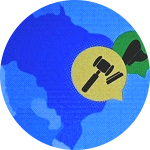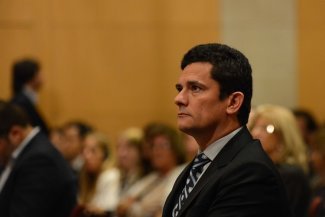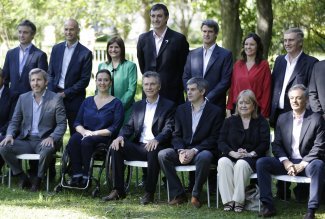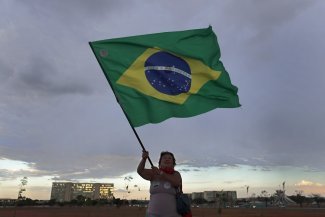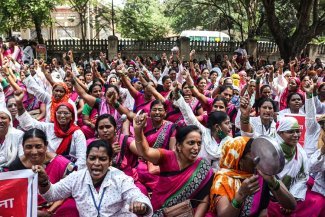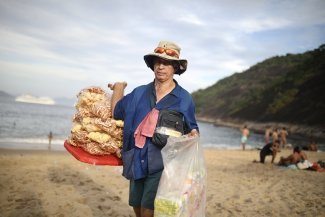Cristina Fernández de Kirchner (centre), Argentina’s vice president and former president, recently convicted on corruption charges. Fernández de Kirchner was supported at an event on 21 March 2023 by several former Latin American leaders, including Rafael Correa of Ecuador (fourth from the right) and Evo Morales of Bolivia (second from the left), who question the judicial cruelty against leaders of the left in Latin America.
On 6 December, an Argentinian court sentenced current vice-president and former two-term president (2007-2015) Cristina Fernández de Kirchner to six years in prison and lifelong disqualification from holding public office. Her conviction, which some have hailed as historic, remains subject to appeal. Its grounds were not explained at the time, and Kirchner’s position grants her privileges that prevent her arrest.
In October 2023, Argentina will elect a president. Kirchner, who led the polls prior to her conviction, has since ruled out her candidacy. In an allusion to the failed assassination attempt against her, which is currently under investigation and potentially implicates members of the intelligence community, political leaders and the founders of right wing hate campaigns, Kirchner labelled the judiciary and media as a ‘firing squad’. This incident is just one more in a long series of political and economic shockwaves that have rocked the country and its government.
What would happen if a person, previously prosecuted for large-scale smuggling and tax fraud, whose economic conglomerate benefited from the nationalisation of millions of dollars in debt during the last military dictatorship – three and four decades ago, respectively – were to be elected president?
What would happen if this person, once in office, forgave other massive debts held by family businesses?
Worse still, what would happen if, in a scandal reminiscent of Watergate, he were to use state intelligence for illegal internal espionage against opponents and allies, even relatives of victims of the worst military tragedy in peacetime. Or if he were to set up a‘judicial roundtable’ to interfere in the justice system, ‘shield’ himself and persecute opponents, or when the responsible official remains at large for two years? Or if he were to voice support for a minister who retains shares in the company he headed before taking office, as well as for an official with millions of dollars of contracts with the government, and only accept their resignation in the face of a mounting scandal while still refusing to investigate them? Or if he were to seek the largest loan in the history of the International Monetary Fund (IMF), a US$57 billion bailout – intended to help him win reelection, according to his own officials – during an election year and with strong capital flight, contrary to the rules of the IMF and the constitution?
Imagine if a president were to be accused of bribing senators and repressing protests in which 38 people were killed by state forces? Finally, what would happen to someone who smuggled 6,500 tons of arms to war regions in violation of UN resolutions, and whose apparent attempt to conceal it caused seven deaths and wounded hundreds when a military factory exploded in 1995?
The answer to all of these questions, which are not hypothetical but historical facts, is ‘nothing’ – or next to nothing, with only the slightest appearance of something.
A one-sided fight against corruption
All these crimes remain unpunished, though many have been proven in court. None of them involve Cristina Fernández de Kirchner (CFK), but presidents who served before her. This selective fight against corruption has given the judiciary a bad name and contributed to suspicions of judicial and journalistic bias, at the very least, and at the worst has strengthened ‘armed’ opposition to the leadership of Argentina’s popular camp. Similar parallels can be found throughout Latin America.
Indeed, former right-wing president Mauricio Macri (2015-2019), son of the founder of the powerful economic group that bears his surname, is the person behind the first six ‘questions’. The last question refers to one of the many scandals attributed to Carlos Menem, president in a right-wing Peronist coalition from 1989 to 1999. The second-to-last ‘hypothetical’ refers to Fernando De la Rúa, who briefly served as president (1999-2001) for the right-wing Radical party, succeeding Menem with a mandate to reverse the austerity and corruption of his predecessor.
Menem and De la Rúa died decades after the events in question, as free men. The convictions they did receive were overturned by other judicial bodies, including the Supreme Court of Justice, which stretched the time limits until the statute of limitations expired. The media showed little interest at the time. Macri, for his part, enjoys freedom and good health. He recently decided that, given his slim chances, he will not seek a second presidential term in the 2023 elections, a decision that has been lauded as noble in the media. He previously lost his reelection bid in 2019, despite the IMF’s ‘endorsement’.
In contrast, on 6 December of last year, CFK was convicted of ‘fraudulent administration’, in a controversial case for due process violations, which can be appealed. The court did not publish the grounds for its decision until March, three months after handing down the sentence, a move that could be viewed as a temporarily incontestable and unappealable conviction in the midst of an election year.
The political and media effect was immediate and extreme, as if by design. CFK, who until then had a chance of winning a third term as president, resigned her candidacy to avoid damaging her campaign.
This was similar to what happened to Inácio Lula da Silva in Brazil in 2017. His conviction, later overturned, occurred during the presidential campaign and paved the way for Jair Bolsonaro and his extreme right-wing neoliberal economic programme to come to power.
CFK’s political allies, including her former vice-president, former cabinet officials and even allied Indigenous leaders, whose cause has been taken up by international organisations, were also imprisoned with incredible speed and sometimes lack of due process. Peronists have labeled several of them as political prisoners. CFK’s late spouse, former president Néstor Kirchner (2003-2007), was also insistently and posthumously accused by the media and the judiciary of being the founder of an illicit organisation that he allegedly ‘inherited’. Raúl Alfonsín, Argentina’s first democratically elected president following the military dictatorship (1983), a progressive who is today revered as incorruptible, had previously denounced the mendacious treatment he received from various media outlets, particularly the Clarín Group, which made baseless accusations against him. Both in Alfonsín’s case, and years later with Lula, a narrative was put forth, without evidence, by controversial oligopolistic media (in Lula’s case, there were also conflicts of interest with Sergio Moro, the former judge who would later become Bolsonaro’s justice and public security minister).
Media outlets, whose investors include important politicians like Macri, sometimes linked to corruption cases, are precisely those responsible for systematically introducing hatred into politics, and for making candidates of the flourishing extreme right permanent fixtures on prime-time media, where they are given a platform to spout their violent rhetoric.
A war in the media and in the courts
Corruption expert Sarah Chayes describes a pattern of organised corruption in at least 65 countries throughout the world, where actors from both the media and the judiciary attack their adversaries and guarantee their own impunity. Chayes does not underestimate the difficulty of identifying, proving the existence of and combatting such networks.
CFK and other Latin American leaders have publicly denounced what they call a new Operation Condor (the strategy of intervention in Latin America in the 1970s), alleging that public opinion and the judiciary are being manipulated to prevent policies contrary to the ‘Washington Consensus’ from being enacted. These leaders (Evo Morales, Rafael Correa, CFK and Lula, among others) argue that the ‘neo-coups’ against popular governments in the region over the last decade and a half (from the one that brought down Fernando Lugo in Paraguay to Dilma Rousseff and Lula in Brazil) are a deliberate result of this strategy.
Of course, coordinated attacks on popular governments in the region cannot simply be inferred from the existence of similar patterns, players and strategies. As Chayes points out, it is difficult to find evidence incriminating the possible perpetrators.
The existence of the original Operation Condor, however, wasn’t proven until two decades later. Similarly, the genocides committed by military dictatorships like Argentina’s, the thousands of people disappeared, tortured and executed without trial or records to prove coordination or common responsibility, all acts that were treated as isolated incidents, took time to fully come to light.
A few days before Kirchner’s conviction, the conversations of a group comprising members of the judiciary, officials of the main opposition party, an intelligence agent, and the executives of a major multimedia company, were leaked. This unexpected proof of the existence of lawfare (the political use of the judiciary to persecute opponents), together with the admission that the prosecutors in CFK’s case met at the residence of her opponent Macri, provide a clear picture of the phenomenon in question. The leaks have triggered calls for judicial reform and the impeachment of the Supreme Court, which has little chance of succeeding given the current balance of power in Congress.
Similarly, the revelations of “anti-Kirchner campaigning” that came out during the Cambridge Analytica scandal hearings in the British Parliament have not been forgotten.
Of course, there are real cases of corruption on the left, but the need to examine possible misbehaviour in the judicial, intelligence and media systems has become imperative.
In Santiago Mitre’s excellent Oscar-nominated and Golden Globe-winning film Argentina 1985, a shocking reconstruction of the Trial of the Juntas, serves a reminder that systematic patterns of behaviour were conclusive for the tribunal proving the existence of an organised plan. The same should hold true for the systematic pattern of criminalisation of progressive and popular democratic leaders in Latin America.



